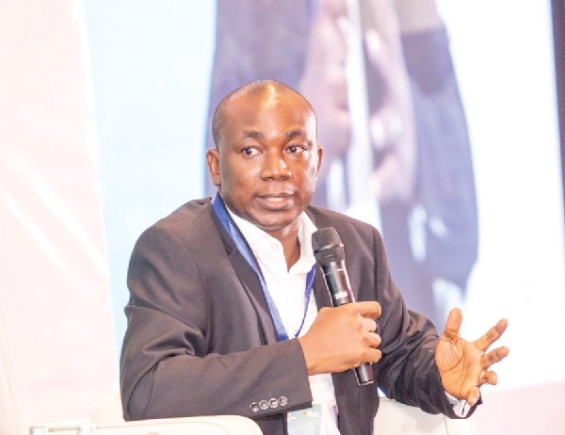
Economic reset must be people focused — Prof. Bokpin
Ghana's urgent need for economic course correction has become more apparent with experts calling for a people-focused reset of the economy, as inflation continues to be a major problem for many households in the country.
Despite claims of economic recovery, households continue to struggle with basic needs as the country failed to make meaningful progress in controlling inflation throughout 2024.
Starting the year at 23.2% and ending at 23.8%, the persistently high inflation has particularly impacted food prices, affecting over 60% of public sector workers who earn less than GH¢3000 monthly.
Speaking on the Graphic Business X Dialogue, Economist, Professor Godfred Bokpin said, "we cannot talk about economic recovery when the bulk of what we celebrate as good has not been people-focused.
He argues that Ghana's economic policies over the past 30 years have consistently failed to track how progress impacts ordinary citizens, leading to widening inequality and leaving millions behind.
The situation appears direr when compared to regional peers such as Côte d'Ivoire, where food inflation remains below 3%.
With food expenses consuming between 42% and 44% of Ghanaian household expenditure, high food prices have created what experts describe as an unsustainable burden on families.
Call for reset
The call for a reset comes as Ghana's new government takes office. Experts emphasize that any economic recovery must prioritise people-centred policies over traditional macroeconomic indicators.
This includes addressing food security, reducing income inequality and ensuring that economic growth translates into tangible benefits for the average Ghanaian.
"Inflation is the only approved armed robber to steal the value of your income," says Bokpin.
To address food inflation, he advocates immediate practical steps such as ensuring the timely delivery of agriculture inputs and preventing fertiliser diversion to neighbouring countries.
He emphasized that the success of any economic reset depended on making food cheap and available, thereby preserving household cash flow and enabling savings and investment.
The core challenge, according to Bokpin, lies in transforming Ghana's economy from one that celebrates abstract GDP figures to one that delivers tangible benefits to ordinary citizens.
He warns that without structural transformation, any improvements in inflation rates will be temporary, pointing to Ghana's brief achievement of single-digit inflation in December 2019 that proved unsustainable.
Jobless growth
While Ghana's GDP growth in the first two quarters exceeded forecasts, reaching 5% and 7.7% respectively, Bokpin dismisses this as "not people-focused growth."
He characterised it as "jobless growth" that fails to benefit the majority of Ghanaians.
The economist warns that such growth lacks sustainability, particularly given its heavy dependence on gold prices.
He emphasised that nearly 30% of Ghana's population lives in extreme poverty, indicating a clear need for a change in economic direction.
Bokpin advocated a reset that extends beyond traditional economic metrics to encompass what he calls the "five Ps" at the national level, while the private sector should focus on the "triple bottom line" - economic, social and ecological considerations.
"We cannot talk about economic recovery amid destruction to our water bodies and ecological ecosystem," Bokpin argues, stressing that there can be no economic sustainability without ecological sustainability.
IMF programme
President John Dramani Mahama has indicated that his government will review and adjust the country’s three-year programme with the IMF and other existing agreements with Ghana's development partners to better meet the needs of the public.
He said the adjustment was crucial and would help put the new government on the same springboard with its development partners to begin the rebuilding of the economy and the country.
The IMF has also indicated that it was open to renegotiating the programme, provided accompanying reforms aren’t jeopardised.
Prof. Bokpin supports these calls, stating that the programme's growth forecasts were insufficient to lift millions out of poverty or narrow the inequality gap.
Using a Biblical metaphor, Bokpin explains that "a new wine can only be put in a new wine skin," suggesting that the new government's mandate requires a fresh economic framework rather than trying to work within existing constraints.
Drawing parallels with 2017, when Ghana's IMF programme was modified to accommodate the then-new government's promises, Bokpin suggests similar adjustments may be necessary now to fulfil current electoral mandates.
The economist emphasizes that leadership must be the starting point for any meaningful reset. Bokpin stressed that the reset required a coordinated response from both public and private sectors.
Monetary policy
The economist also criticised the over-reliance on monetary policy interventions, arguing that Ghana needs to focus more on supply-side solutions and structure reforms.
He highlighted the need for effective governance at both public and private sector levels, describing them as complementary rather than substitutes.
He said economic policies must prioritise human development alongside traditional economic metrics.
The professor argued that Ghana's current challenge is not just about economic management but about reimagining development in a way that benefits all citizens.
He said economic policies must, therefore, be evaluated based on their impact on ordinary citizens rather than just macroeconomic indicators.
He called for a new approach to measuring economic success, one that goes beyond GDP to include metrics for social progress and environmental protection.
He cautioned that continuing on the current path risks further widening the gap between the privileged few and the poor majority.
Success in this reset, according to Bokpin, required moving beyond temporary fixes to address fundamental structural issues in the economy.
He emphasised that the reset must be comprehensive, touching all aspects of economic and social life rather than focusing solely on financial metrics.
He said the ultimate goal of this reset must be to create an economy that works for all Ghanaians not just a privileged few.